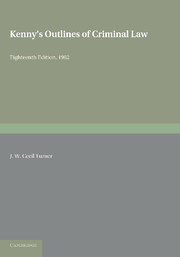Book contents
- Frontmatter
- Preface to the Sixteenth Edition
- Preface to The Seventeenth Edition
- Preface to the Eighteenth Edition
- Contents
- Index of cases
- Index to the principal statutes
- List of principal books cited
- BOOK I GENERAL CONSIDERATIONS
- BOOK II DEFINITIONS OF PARTICULAR CRIMES
- BOOK III MODES OF JUDICIAL PROOF
- BOOK IV CRIMINAL PROCEDURE
- CHAPTER XXIX LIMITATIONS ON CRIMINAL JURISDICTION
- CHAPTER XXX CRIMINAL COURTS
- CHAPTER XXXI SUMMARY PROCEDURE
- CHAPTER XXXII ORDINARY PROCEDURE
- CHAPTER XXXIII ORDINARY PROCEDURE
- CHAPTER XXXIV ORDINARY PROCEDURE
- Appendix I The meaning of ‘credit’
- Appendix II II Rules as to admission of evidence which reveals to the jury facts discreditable to the person accused
- Appendix III III Forms of indictment
- Index
CHAPTER XXIX - LIMITATIONS ON CRIMINAL JURISDICTION
from BOOK IV - CRIMINAL PROCEDURE
Published online by Cambridge University Press: 05 June 2016
- Frontmatter
- Preface to the Sixteenth Edition
- Preface to The Seventeenth Edition
- Preface to the Eighteenth Edition
- Contents
- Index of cases
- Index to the principal statutes
- List of principal books cited
- BOOK I GENERAL CONSIDERATIONS
- BOOK II DEFINITIONS OF PARTICULAR CRIMES
- BOOK III MODES OF JUDICIAL PROOF
- BOOK IV CRIMINAL PROCEDURE
- CHAPTER XXIX LIMITATIONS ON CRIMINAL JURISDICTION
- CHAPTER XXX CRIMINAL COURTS
- CHAPTER XXXI SUMMARY PROCEDURE
- CHAPTER XXXII ORDINARY PROCEDURE
- CHAPTER XXXIII ORDINARY PROCEDURE
- CHAPTER XXXIV ORDINARY PROCEDURE
- Appendix I The meaning of ‘credit’
- Appendix II II Rules as to admission of evidence which reveals to the jury facts discreditable to the person accused
- Appendix III III Forms of indictment
- Index
Summary
Section I. Introductory
Procedure is a part of adjective law. We have now discussed the substantive law of crime, and also that portion of the adjective law which regulates the evidence by which crimes are to be proved. Finally, we have to consider the remaining portion of adjective law, that which regulates the procedure by which offenders who have committed crime are brought to punishment. We may begin by mentioning some limitations upon the exercise of this procedure, and then go on to describe the various courts in which it is exercised.
Section 2. Limitation by Time
NONE AT COMMON LAW
To civil actions, lapse of time may often operate as a bar: vigilantibus, non dormientibus, jura subveniunt. But it can rarely affect a criminal prosecution. For the King could do no wrong; and consequently it was impossible that his delay in pressing his claims, whether civil or criminal, could be due to any blamable negligence. Accordingly at common law it was a rule that those claims remained unaffected by lapse of time: nullum tempus occurrit regi. And though, as regards civil claims, this kingly privilege has now been subjected to limitations by 9 Geo. Ill, c. 16, it still operates almost unimpaired in criminal prosecutions. Hence, in several noteworthy cases, offenders have been brought to justice many years after the commission of their crimes. In 1905 John Appleton received sentence of death (afterwards commuted) on his own confession of a murder committed in 1882 (The Times, 15 July 1905). The trial of Governor Wall (1802) took place nineteen years, that of Edward Shippey (1871) thirty years, and that of William Home thirty-five years, after the respective murders of which they were accused. Stephen,
indeed, mentions a prosecution in 1863 for the theft of a leaf from a parish register no less than sixty years previously.
- Type
- Chapter
- Information
- Kenny's Outlines of Criminal Law , pp. 531 - 536Publisher: Cambridge University PressPrint publication year: 2013



